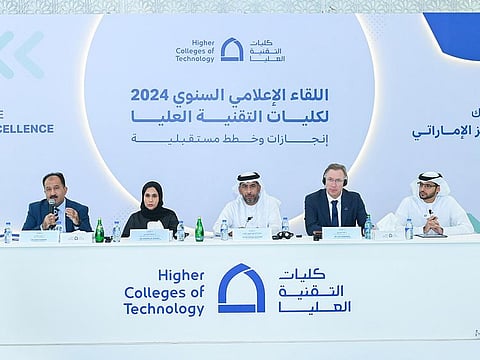UAE: HCT introduces sabbatical leave for professors, vocational certification for students
Preparing graduates for evolving job market part of core strategy of educational model

Dubai: A federal higher educational institute in the UAE is sending professors on sabbatical leave to get field training and offering apprenticeships and vocational certification courses for students to prepare Emiratis for future jobs.
The Higher Colleges of Technology (HCT), which has 16 campuses across the country, on Tuesday announced the launch of professional certification courses for high school students and individuals and the implementation of the ‘Outbound Industry Sabbatical Leave’ initiative for faculty.
Dr Faisal Alayyan, HCT president and CEO, announced these details at a press conference held to celebrate the first anniversary of HCT’s transformative education model.
“HCT launched our new educational model in 2023 to answer the new demand of the job market. We also announced plans to offer three study tracks for students, where the vocational diploma programme was added to the applied bachelor’s programme, which created new opportunities for hundreds of students according to their abilities and interests. Today, HCT is preparing to add the third track - professional certificates,” said Dr Alayyan.
One-year certificate courses
Linked to career accelerators, the one-year certificate courses are expected to increase students’ options according to job market requirements.
Sumaya Abdulaziz Al Hosani, HCT Vice President for Strategy and the Future, told Gulf News that high school students, who have not achieved the requirements for other pathways, will be able to enrol in the vocational certification programmes to quickly join the workforce.
“We have the micro-credentials embedded within the programmes. It is also an exit programme for students opting out of higher level courses due to any reasons and fresh certification for new high school students who will join us,” said Al Hosani.
Apprenticeship, Nafis
Speaking to Gulf News later, Dr Alayyan said the Apprenticeship Programme will be expanded by tying up with leading companies. “Students spend a minimum of six months in companies for the apprenticeship. They need to be treated and evaluated like employees by both the companies and the university so that they are well-prepared for the job market when they go for an interview or get hired by the same company where they did the apprenticeship.”
Last year 6,180 students benefited from apprenticeships across around 30 majors in the bachelor’s and diploma programmes.
Sabbatical leave for faculty
HCT now requires faculty to have both academic and professional experience, said Dr Luc Verburgh, HCT chief academic officer. He said the introduction of new educational tracks required highly qualified faculty with renowned international experience in applied education.
Dr Verburgh noted that HCT welcomed 75 new academic staff members in the previous academic year, while this year, HCT has attracted over 110 additional academic staff members to handle the expanded programmes.
To enhance the professional development of academic staff members and ensure that they remain constantly updated with the job market needs, HCT has launched its Outbound Industry Sabbatical Leave initiative.
Dr Verburgh said the initiative offers faculty members the chance to spend a sabbatical period of two weeks to one month in a workplace setting every year, during which they gain insights into the latest experiences, applications, and practical methodologies relevant to their field.
“This opportunity allows faculty members to engage in hands-on experimentation with cutting-edge technologies and market experiences. They can then leverage these insights to enhance their teaching methodologies and impart practical knowledge to their students, thereby fostering the development of applied skills,” Dr Verburgh said.
Open to expats
While HCT primarily serves UAE nationals, Dr Alayyan said it is also open to students of different nationalities. “HCT is open to all, ensuring a diverse learning environment,” he stated.
A total of 5,300 students are expected to enrol in the first semester of the academic year 2024-2025, with 3,000 registering for the diploma programmes.
HCT aims to offer 33 new programmes, and develop and revamp 15 academic programmes. These include 24 certificate courses, four professional diplomas and five bachelor’s courses.
More than 92,000 male and female students graduated from HCT between 1990 and 2020. As many as 2,600 students graduated in the academic year 2022-2023, with a 75 per cent employment rate in the public and private sectors.



